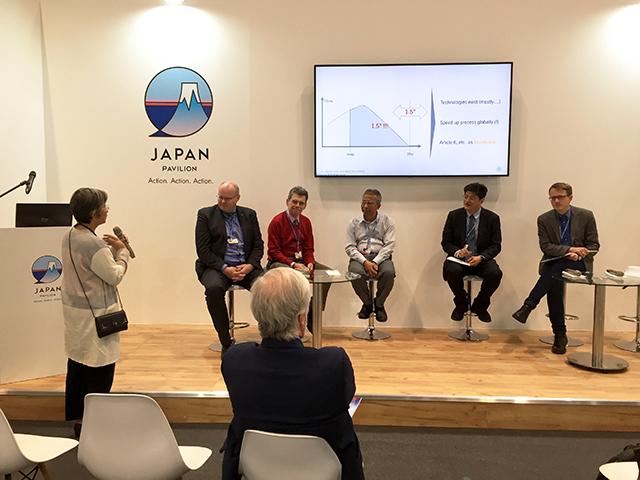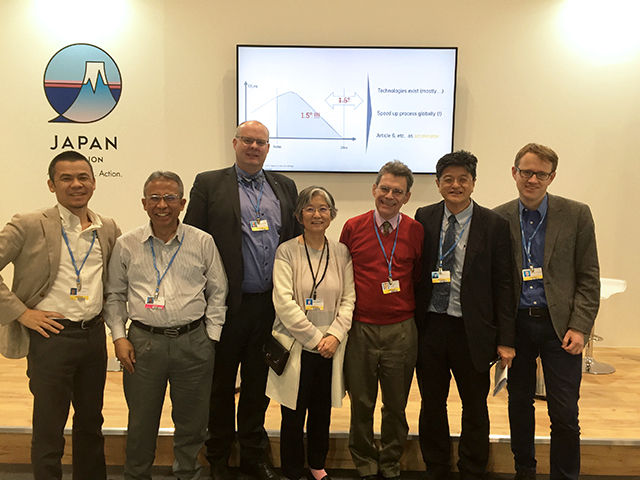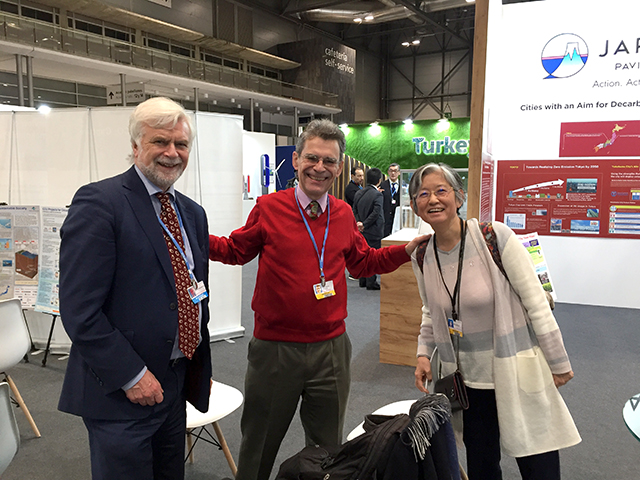Event Schedule - COP25 JAPAN PAVILION
2019.12.06
Can "our" long-term strategies make 1.5°C societies a reality?
Organizer
- Institute for Global Environmental Strategies (IGES)
- Italian National Agency for New Technologies, Energy and Sustainable Economic Development (ENEA)
Event Overview
Agenda of the Event
-
15:45 - 15:55 (10 min) Introductory Presentation
Mikiko Kainuma, Senior Research Advisor, Institute for Global Environmental Strategies (IGES) -
15:55 - 16:20 (25 min) Key Messages of the IPCC Special Reports
Jim Skea, Co-Chair, IPCC Working Group III -
16:20 - 16:35 (15 min) Roles of Long-term Strategies for Decarbonization
Kentaro Tamura, Director, Climate and Energy Area, IGES -
16:35 - 17:15 (40 min) Panel Discussion: "Can 'our' long-term strategies make 1.5°C societies a reality?"
Panelists:
- Rizaldi Boer, Bogor Agricultural University
- Ho Chin Siong, Universiti Teknologi Malaysia
- Jean-Charles Hourcade, Centre International de Recherche sur l’Environnment et le Développement (CIRED)
- Wolfgang Obergassel, Wuppertal Institut (WI)
- Hans-Jörn Weddige, Thyssenkrupp
Moderator: Mikiko Kainuma, IGES
Speaker
- Mikiko Kainuma, Institute for Global Environmental Strategies (IGES), Senior Research Advisor
- Jim Skea, IPCC Working Group III, Co-Chair
- Kentaro Tamura, Institute for Global Environmental Strategies (IGES), Programme Director, Climate and Energy Area
- Rizaldi Boer, Bogor Agricultural University, Professor
- Ho Chin Siong, Universiti Teknologi Malaysia, Professor
- Jean-Charles Hourcade, Center for International Research on Environment and Development (CIRED)
- Wolfgang Obergassel, Wuppertal Institute for Climate, Environment and Energy (WI)
- Hans-Jörn Weddige, Thyssenkrupp AG, Germany, Group Coordinator Energy, Environment and Climate Policies
Event Summary
The side event began with a presentation by Senior Research Advisor Mikiko Kainuma (IGES), followed by presentations from IPCC Working Group III (WG III) Co-Chair Jim Skea and Climate and Energy Director Kentaro Tamura (IGES). The latter half of the session was a panel discussion moderated by Dr. Kainuma, featuring five panelists: Professor Rizaldi Boer (Bogor Agricultural University), Professor Ho Chin Siong (Universiti Teknologi Malaysia), Dr. Jean-Charles Hourcade (CIRED), Dr. Wolfgang Obergassel (WI), and Dr. Hans-Jörn Weddige (Thyssenkrupp).
Presentations:
In his presentation, Professor Jim Skea (IPCC WG III) summarised the IPCC Special Report on Global Warming of 1.5℃ (SR1.5) and the Special Report on Climate Change and Land (SRCCL). He stressed that "rapid, far-reaching and unprecedented changes in all systems" would be necessary to realise any of the four illustrative model pathways that would be consistent with global warming of 1.5℃ (SR1.5). Moreover, while Skea mentioned that the implementation of mitigation options may cause competition for land, he also explained that, of the 28 different response options examined in the SRCCL, most had positive effects on mitigation, adaptation, desertification, land degradation, and food security. Lastly, he spoke about the challenges for the IPCC 6th Assessment Report (AR6), stating that the integrated assessment models (IAMs) rely too much on the CDR and that most IAMs do not explicitly treat nature-based solutions. He then concluded his presentation by reiterating that speed and scale are necessary to realise a 1.5℃ world.
Director Kentaro Tamura (IGES) then spoke about the roles of long-term strategies for decarbonisation. He argued that a country’s long-term strategy is an opportunity to translate the global goal into the national context, as well as send policy signals to businesses and investors to adjust their business models and investment portfolios to be in alignment with the long-term strategy. He also mentioned that long-term strategies can be used to drive short- and mid-term actions (including Nationally Determined Contributions (NDCs)). Finally, he explained that in Japan, nine prefectural governments and 18 cities and towns have declared to have net zero emissions by 2050.
Panel Discussion:
Professor Rizaldi Boer argued that, with respect to Indonesia’s current NDC, substantial effort is necessary to meet the 1.5℃ target. He then explained three decarbonisation scenarios toward meeting the 1.5℃ target: ① Agriculture, Forestry, and Other Land Use (AFOLU) changes and renewable energy deployment; ② AFOLU changes, renewable energy deployment, and carbon capture and storage (CCS); and ③ AFOLU changes and industrial shifts from making goods to providing services. At the end, he spoke about the challenges in energy sector transformation and in land-based mitigation. For instance, one challenge faced in energy sector transformation is limited renewable energy deployment, which is due to competition with low-cost fossil fuels and inadequate infrastructure. Moreover, Professor Boer explained that national stakeholders are still considering maintaining coal-related industries and have little awareness that such assets will be stranded. Regarding challenges in land-based mitigation, he shared that large investments and institutional changes are necessary to manage land and forests and that optimising the use of unproductive land has been a key challenge, especially with respect to land rights. He also brought to light topics such as an incentive system for accelerating the development of timber plantations on degraded land, improvements to crop productivity and land use efficiency, and reductions in food waste.
Professor Ho Chin Siong (Universiti Teknologi Malaysia) emphasised the importance of mainstreaming climate action plans to bridge science and implementation. He explained that, in Malaysia, starting with Iskandar, low-carbon scenarios were created for various cities including Kuala Lumpur. Then, action plans were formulated based on these scenarios, and currently, specific initiatives are underway. Professor Ho emphasised the importance of leapfrog development, international collaboration as well as stakeholder engagement.
Dr. Jean-Charles Hourcade (CIRED) shared highlights of the recently launched "Achieving a Safer and Fairer World, A Climate Finance Initiative". He argued that, while investments must be directed toward decarbonised infrastructure and action in order to build a decarbonised society, funds continue to simply be directed to real estate. As a result, the real estate in Paris is expensive, but investments toward decarbonisation in Africa are not accelerating. To address this problem, Dr. Hourcade explained that it is necessary to have public guarantees for avoiding risks and promoting low-carbon initiatives. Moreover, he emphasised the importance of scaling up low-carbon investments using existing public resources and redirecting 0.6% of global savings towards low-carbon investments. He also stressed that it is necessary to allow lower credit-rated developing countries access to lower-cost financing and to accelerate the short-term growth in both developing and developed countries.
Dr. Wolfgang Obergassel (WI) explained that German land transport emissions are still at 1990 levels and that, to address this, it is necessary to break away from the traditional paradigm ("transport growth is good", "mass motorisation", and "large vehicles"). Moreover, he emphasised that, to meet the 1.5/2℃ targets, all sectors must have a shared vision (based on long-term strategies, etc.) and must undergo fundamental transformation. In his takeaways, he also stated that sectors must be held accountable (i.e. emission reduction targets and efforts of each sector made public) and that stakeholder engagement is indispensable.
Dr. Hans-Jörn Weddige (Thyssenkrupp) introduced Thyssenkrupp’s initiatives to decarbonise by 2050. With the view that technologies to reduce emissions (mostly) exist today, Dr. Weddige elaborated on the process of making steel by injecting hydrogen. He also spoke about another process that involves producing green hydrogen via electrolysis using renewable energy and using the hydrogen in chemical plants . He also mentioned that he is paying close attention to the outcomes of the Article 6 negotiations, as it will influence how the company’s initiatives can spread globally.



Other Events On This Day
Ocean and Climate Change – Contribution of the Space Technology
Sasakawa Peace Foundation, Japan Aerospace Exploration Agency (JAXA)
City-University Collaboration for Enhancement of Urban Community Resilience ~Educational Partnerships for Innovation in Communities (EPIC)~
Ministry of the Environment, Japan (MOEJ)
Approaches, Opportunities and Options for Enhancing Nationally Determined Contributions (NDCs)
Japan International Cooperation Agency
Can "our" long-term strategies make 1.5°C societies a reality?
Institute for Global Environmental Strategies (IGES)